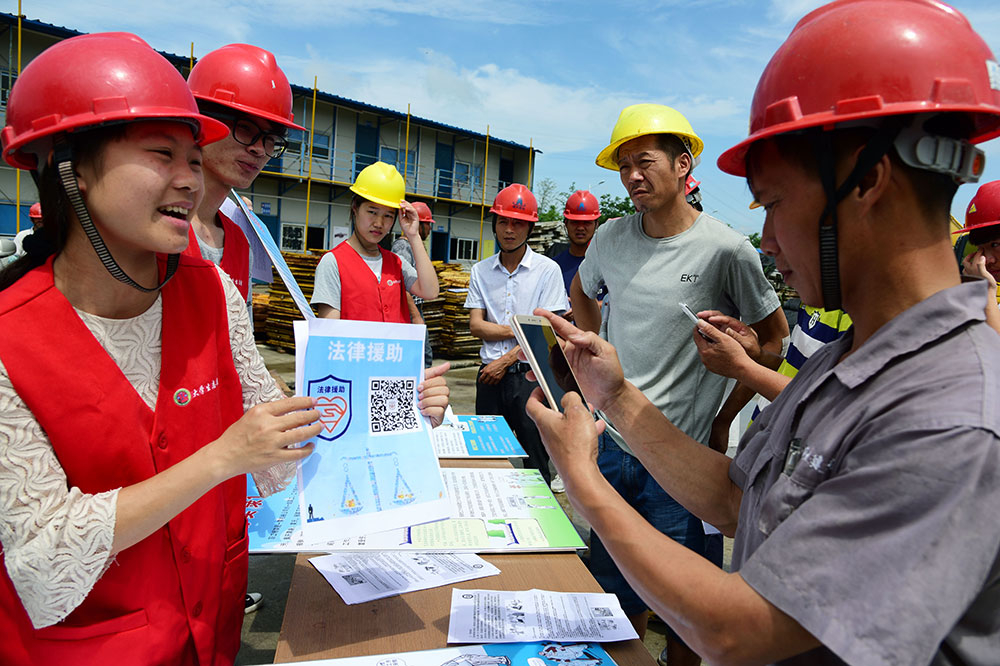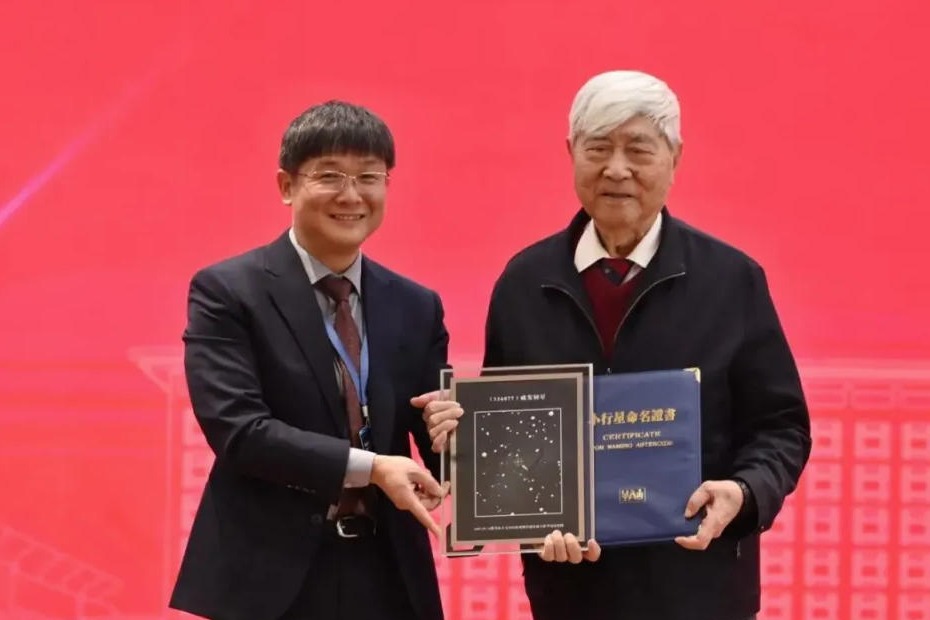New Progress In Legal Protection Of Human Rights In China


II. Promoting Law-based Administration to Protect the Citizens' Lawful Rights and Interests
Law-based administration is important in legal protection of human rights. Since the 18th CPC National Congress in 2012, China has made it clear that all government functions and powers must be provided for in the law, strictly regulated the administrative enforcement of law, strengthened checks and scrutiny over government power, and put into effect the "Implementation Outline for Building a Law-based Government (2015-2020)", thereby effectively protecting the people's legitimate rights and interests.
Delimiting administrative power in accordance with the law. That all government functions and powers are provided for in the law is the prerequisite for law-based administration. The State has accelerated the process of defining in law the administrative structure and its functions, powers, procedures and responsibilities, prohibited administrative organs from expanding power beyond the law, and confined the exercise of power in an institutional "cage".
China is also pressing ahead with the reform of administrative approval. Since the 18th CPC National Congress, the State Council departments have canceled the requirement for administrative approval on 618 items and put an end to the practice of non-administrative approval, and 269 items designated by the central government for local government approvals and accreditations have been annulled. The State Council has removed 320 intermediary services from administrative approval, and cut off over 70 percent of professional qualification approvals and accreditations set by its departments. The investment catalogue for government approval has been revised three times, by means of which the number of investment items requiring central government approval has fallen by 90 percent.
China has implemented the system of power or responsibility list, through which the public can obtain information about government functions, duties and powers, and their legal basis. By 2016, 31 provincial-level governments had published such lists.
The Chinese government has strengthened the supervision and management of normative documents. Normative documents issued by government organs should not set items for administrative permission, punishment or coercion. All administrative regulations and normative documents must be filed for record and examined, and mistakes, if any, must be investigated.
Checking in accordance with the law the exercise of administrative power. China aims to establish an authoritative and efficient administrative law enforcement system in which power is consistent with responsibility.
The Chinese government has accelerated the reform of the administrative law enforcement system, and further promoted synthesized law enforcement in fields such as food and drug safety, industrial and commercial quality inspection, public health, workplace safety, resource and environmental protection, traffic and transport, and urban and rural construction.
It has improved the administrative law enforcement procedure, and explored the means to establish a benchmark system for discretion in enforcement. In some areas China has conducted three experiments: disclosing information concerning administrative law enforcement, recording the whole enforcement process, and reviewing the legality of major enforcement decisions.
The government has tried out innovative enforcement methods, and widespread non-coercive ones, including persuasion, teaching, citing good examples, and administrative guidance and rewards. It has regulated words and conduct of law-enforcement personnel, and required them to be flexible, reasonable and open in their approach to enforcement. It has established a qualification system for enforcement personnel and prohibited anyone without the required license from serving.
In order to make full progress in building a law-abiding public security system, the Chinese government issued the "Decisions on Further Regulating the Public Security Departments in Law Enforcement", established more detailed law-enforcement standards and guidance, improved the supervision and management system, and amplified the law-based decision-making mechanism. By the end of June 2017, 2.27 million police officers all over the country had basic level certification for law enforcement, 1.35 million had obtained mid-level certification, and almost 41,000 had gained upper-level certification.
China has expanded the auditing of all aspects of government affairs, especially in areas like public funds, state property, national resources, and how officials in leading positions fulfill economic duties. It has published the audit results regularly, so as to give a full play to the role of audit in scrutinizing and checking the exercise of power. The Chinese government has strengthened the accountability investigation for administrative errors. To build a responsible government, it has set up a mechanism of internal legitimacy review of major decisions, and explored the means to establish and implement a lifelong liability accounting system for major decisions and a retrospective mechanism to hold people accountable for wrong decisions. Abiding by the principle that the decision-maker assumes the responsibility, anyone who causes heavy losses by exceeding his/her competence or infringing the decision-making procedure must be held accountable.
In order to raise officials' awareness of responsibilities for protecting the ecological system and people's environmental rights, the Measures for Liability Investigation of Party and Government Officials for Damage to Ecological Environment (trial) stipulate that both senior Party officials and leading government officials will have lifelong accountability for 25 specified types of damage to the ecological environment.
Safeguarding in accordance with the law the citizens' right to participate in administrative decision making. The government has improved decision-making procedures, which define public participation, expert evaluation, risk assessment, legality review, and collective discussion and decision as the legal procedures for making major administrative decisions.
The central government has encouraged local governments at or above the county level to employ legal advisers and lawyers to provide legal opinions for major administrative decisions and actions.
China has also explored to set up a consulting expert database for administrative decisions. The governments invite experts and specialized institutes to discuss on those decision matters of strong professional or technological nature, so as to increase their capabilities in law-based administration.
When making decisions on people's livelihood like E-hailing and express delivery services, the related departments of the Chinese government solicited opinions from a wide range of circles to balance the interests and requests of different groups.
Protecting in accordance with the law the citizens' right to scrutinize the exercise of administrative power. In the context of the Regulations on the Disclosure of Government Information and adhering to the principle that information is to be withheld only in exceptional circumstances, the government prioritizes for information disclosure in such fields as administrative approval, fiscal budget and final accounts, basic need housing, food and drug safety, land requisition and resettlement of displaced residents.
New channels of disclosure have been created. The government has improved online government information services and online administrative services, giving a greater role to IT in the disclosure of government information and making public access to such information more convenient. The websites of 126 government departments have been upgraded for the benefit of people with disabilities.
The government has set up a registration system that allows complaints and reports of illegal conduct by administrative departments to be made via mail, email, hotlines and other channels of supervision. It also attaches importance to the supervisory role of traditional media like newspapers, periodicals, broadcasters and television, and regulates and accepts online oversight.
Tackling in accordance with the law the serious issues that infringe the citizens' rights of life, health and property. The government takes a zero-tolerance attitude toward environmental pollution. In accordance with the law, the government has closed or rectified small, poorly-managed and heavily-polluting enterprises, and enterprises that illegally discharge pollutants.
The government has strengthened inspection and law enforcement in the catering industry, encouraging open restaurant kitchens.
In order to ensure workplace safety, the government has enhanced supervisory inspections to seek out hidden hazards and dangers through regular open and secret visits, unannounced investigations, and random checks.
China prioritizes the fight against telemarketing scams and internet fraud. The Ministry of Public Security, the Ministry of Industry and Information Technology, and 21 other ministries and institutions have established an interdepartmental meeting mechanism on fighting new forms of telemarketing scams and internet fraud, and the Supreme People's Court, the Supreme People's Procuratorate, the Ministry of Public Security, and several other departments have jointly issued the "Notice on Deterring and Combating Crimes of Telemarketing Scams and Internet Fraud". Through investigation, punishment and prevention of crimes, the related departments have improved the relevant law-enforcement mechanisms, stopped the spread of such crimes, and safeguarded people's security and property.
The government has strengthened social governance and fostered innovation in this regard. By strengthening and innovating governance of a safe society, integrating such governance with the systemic, comprehensive and law-based governance, and addressing the root causes of problems, China has resolved a number of serious problems that threatened the social peace and order. The public's sense of security has been further reinforced.
- 3 killed, 1 injured in South China knife attack
- Taiwan opposition lawmakers announce plan to impeach Lai Ching-te
- Half marathon route along Suzhou Creek in Putuo
- People across China hold diverse events to mark Winter Solstice
- China issues guidelines to crack down on tobacco-related illegal activities
- 1 arrested after Hong Kong money changer employee robbed of about 1b yen




































